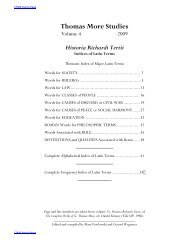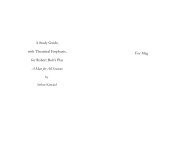life of john picus earl of mirandola - The Center for Thomas More ...
life of john picus earl of mirandola - The Center for Thomas More ...
life of john picus earl of mirandola - The Center for Thomas More ...
Create successful ePaper yourself
Turn your PDF publications into a flip-book with our unique Google optimized e-Paper software.
5<br />
10<br />
15<br />
20<br />
25<br />
Life <strong>of</strong> John Picus<br />
mouth, and after that issuing out again and flying up on high, hiding<br />
themselves among the clouds, escaped both the sight <strong>of</strong> his father and<br />
<strong>of</strong> all them that were present: which prognostication one Paulinus 1<br />
making much <strong>of</strong>, expounded it to signify to us the ⌐ sweet ¬ honeycombs<br />
<strong>of</strong> his ⌐ pleasant ¬ writing, which should show out the celestial gifts <strong>of</strong><br />
God and should lift up the mind <strong>of</strong> men from earth into heaven.<br />
⌐ Of his Person. ¬ He was <strong>of</strong> feature and shape seemly and beauteous,<br />
<strong>of</strong> stature goodly and high, <strong>of</strong> flesh tender and s<strong>of</strong>t, his visage<br />
lovely and fair, his colour white intermingled with comely reds, his<br />
eyes grey and quick <strong>of</strong> look, his teeth white and even, his hair yellow<br />
and not too picked. 2<br />
⌐ Of his Setting Forth to School and Study in Humanity. ¬3 Under the rule<br />
and governance 4 <strong>of</strong> his mother he was set to masters and to learning,<br />
where with so ardent mind he laboured the studies <strong>of</strong> humanityº that<br />
within short while he was (and not without a cause) accounted among<br />
the chief orators and poets <strong>of</strong> that time, in learning marvellous swift<br />
and <strong>of</strong> so ready a wit that the verses which he heard once read he would<br />
again both <strong>for</strong>ward and backward to the great wonder <strong>of</strong> the hearers<br />
rehearse, and over that would hold it in sure re membrance; which in<br />
other folks wont commonly to happen contrary,º <strong>for</strong> they that are swift<br />
in taking be <strong>of</strong>tentimes slow in remembering, and they that with more<br />
labour and difficulty receive it, more fast and surely hold it.<br />
⌐ Of his Study in Canon.º ¬ In the fourteenth year <strong>of</strong> his age, by the<br />
commandment <strong>of</strong> his mother (which longed very sore to have him<br />
priest) he departed to Bononie 5 to study in the laws <strong>of</strong> the Church,<br />
which when he had two years tasted, perceiving that the faculty leaned<br />
to nothing but only mere traditions and ordinances, his mind fell from<br />
it. 6 Yet lost he not his time therein, 7 <strong>for</strong> in that two years, yet being a<br />
child, he compiled a breviary or a sum upon all the decretals, in which,<br />
14 studies <strong>of</strong> humanity the liberal arts / 20 wont...contrary was not usually the case / 23 Canon<br />
Canon Law<br />
1. <strong>The</strong> source is Paulinus <strong>of</strong> Milan’s Vita sancti Ambrosii Mediolanensis episcopi.<br />
2. his teeth...not too picked: <strong>More</strong> reverses the order <strong>of</strong> the Latin (i.e., “his hair...his teeth”). <strong>More</strong>’s “not<br />
too picked” translates the Latin inaffectato, “not done up in an affected style” (CW 1:296, 297).<br />
3. Latin sidenote here: Pr<strong>of</strong>ectus in studiis humanitatis aetate tenella, “Accomplished in the studies <strong>of</strong><br />
humanity [liberal arts] at a tender age” (CW 1: 211).<br />
4. rule and governance: Translates imperio, “command” (CW 1:296, 297).<br />
5. Bononie: Bologna, one <strong>of</strong> the great places <strong>for</strong> the study <strong>of</strong> Canon Law throughout the Middle<br />
Ages. Picus went to Bologna in 1477.<br />
6. his mind...from it: Latin alio deflexit, “he turned elsewhere” (CW 1:298, 299).<br />
7. Yet...therein: Translates the Latin non tamen absque bonae frugis foetura, “not, however, without<br />
reaping a good harvest” (CW 1:298, 299).<br />
7<br />
[55]<br />
Virtue in a<br />
comely body is<br />
more esteemed.<br />
Wit receiveth;<br />
remembrance<br />
holdeth<br />
[56]<br />
<strong>The</strong> faculty <strong>of</strong> Canon<br />
Law











